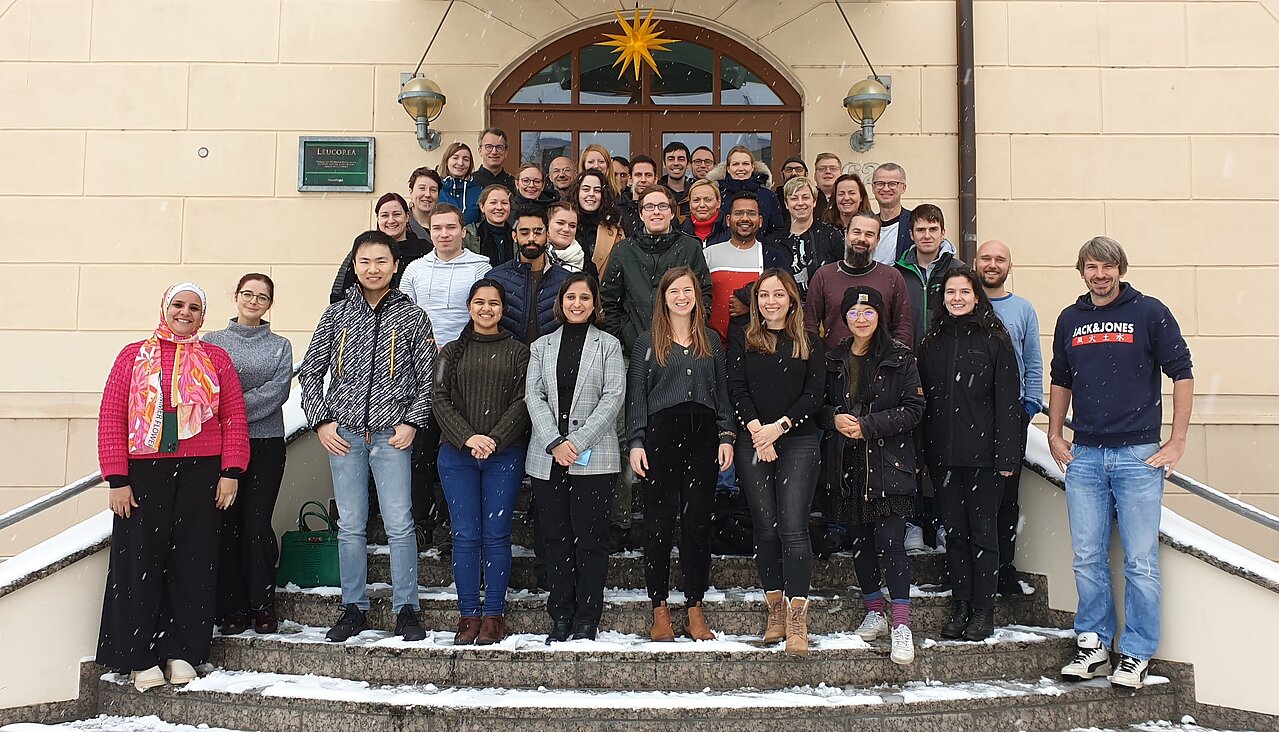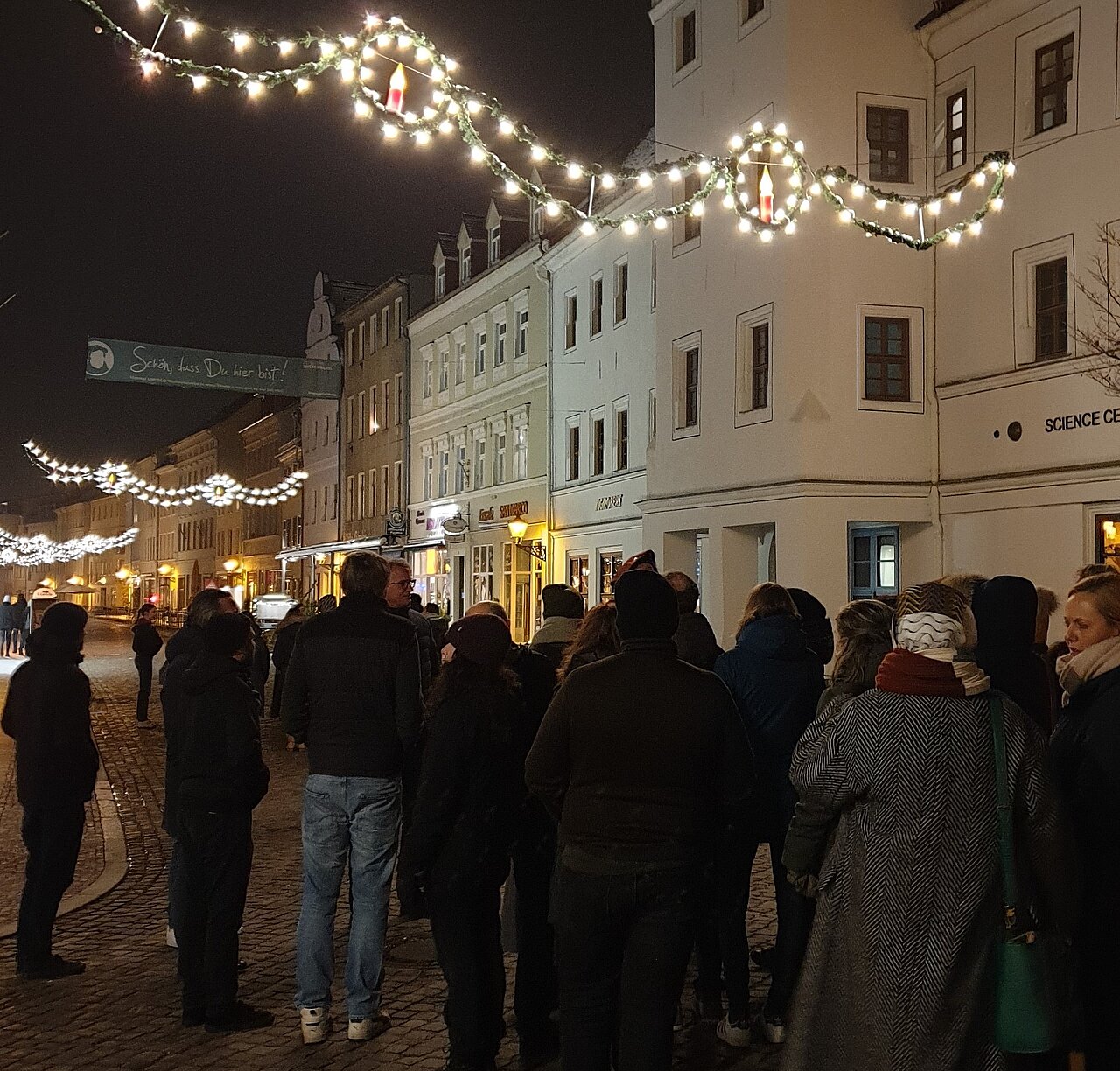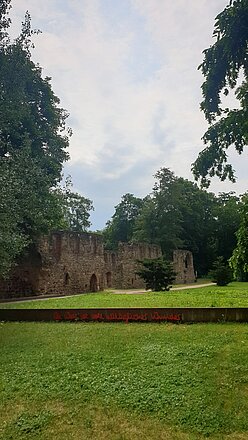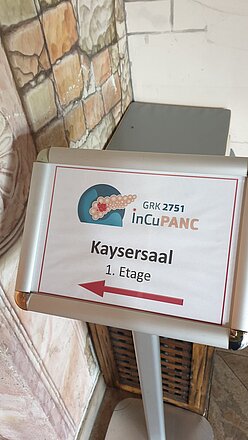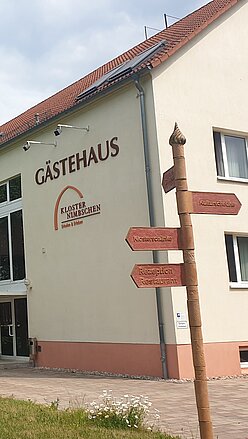Events
Retreat 19. - 21.05.2025 - Looking back on three insightful days in Nimbschen
The annual retreat of our Research Training Group (RTG) 2751 “InCuPanC” offers all members and guests the opportunity to discuss current research progress in pancreatic cancer research. This year, the three-day meeting was once again held at the Nimbschen monastery estate in Grimma near Leipzig - a now tried-and-tested location that proved to be an ideal setting for intensive scientific exchange with its idyllic surroundings and outstanding hospitality.
A particular highlight of this year's retreat was the first meeting of first and second generation doctoral students from our research network. While the doctoral students of the first cohort presented their advanced or completed projects, the new members presented their planned research projects and scientific questions in short talks. The open and collegial atmosphere enabled a lively exchange between the generations, in which questions were asked, experiences shared and further ideas discussed together.
The scientific program was supplemented by contributions from top-class guests.
PhD Anna Brichkina (Philipps University Marburg), Prof. Ivonne Regel (University Medicine Halle) and Prof. Peter Kovacs (University Leipzig) were invited as external experts and gave important impulses from molecular biology research, providing unbiased advice for the further development of the projects.
Prof. Ulrich Ronellenfitsch (University Medicine Halle) presented current studies, including in the field of clinical pancreas research. His contributions impressively illustrated the relevance of preclinical research for subsequent clinical application, thus building a bridge between basic science and clinical practice - an aspect that was particularly beneficial for many doctoral students.
As in previous years, meetings of doctoral students and principal investigators (PIs) were held in parallel to the lecture program. An important topic was the direction of the RTG for the second funding period. Strategies and ideas were discussed on how the successful collaboration within the RTG can be further promoted and strengthened. The discussions also focused on organizational matters and planning for the coming year.
The social program was not neglected either: while the participants competed in bowling on Monday evening, Tuesday evening ended with a cozy campfire. Both evenings offered space for discussions beyond the scientific program and strengthened the cohesion within the group.
With new ideas, constructive feedback and a strengthened sense of community, the group set off on their journey home on Wednesday. As always, it was difficult to say goodbye to Nimbschen - but the insights and impulses gained will have an impact far beyond the three days of the retreat.




At this year’s Research Day of University Medicine Halle, held on 23 May 2025, the Research Training Group 2751 InCuPanC presented several contributions from its interdisciplinary projects investigating inflammatory modulators in the early carcinogenesis of pancreatic ductal adenocarcinoma.
The doctoral researchers of the RTG showcased their current work to a broad university audience through poster presentations. Particularly noteworthy was the achievement of PhD candidate Pit Preckwinkel of project C3, who received the Research Day Poster Award for his outstanding poster presentation. Under the project leadership of Prof. Tony Gutschner, his research focuses on the role of lincRNA in early and inflammation-associated pancreatic carcinogenesis. His poster stood out for its scientific depth and the clear presentation of the findings.
Not only the doctoral researchers, but also the principal investigators of our RTG participated actively. Prof. Gutschner moderated the Elevator Pitch session for the sixth consecutive time, guiding the audience with humor through the one-minute poster presentations of more than 50 projects. In addition, Prof. Michael Böttcher shared insights from his own academic career during the session “Career Paths in Science”.
Participation in the Research Day not only facilitated exchange with other disciplines but also highlighted the importance of supporting early-career researchers. The RTG “InCuPanC” was able to further strengthen its visibility within the university and set important impulses for future collaborations.

From September 28 to October 1 2025, two doctoral researchers from the RTG InCuPanC attended the AACR Special Conference in Cancer Research: Advances in Pancreatic Cancer Research – Emerging Science Driving Transformative Solutions in Boston, USA. The meeting brought together leading international experts to discuss the latest developments in pancreatic cancer biology, early detection, therapeutic strategies, and preclinical models.
The RTG was represented by Tanvi Vikrant Inamdar (project A1) and Atul Verma (project B1), whose abstracts were selected for competitive poster presentations. Presenting their ongoing work to a global scientific audience provided both researchers with valuable opportunities to share their findings, receive constructive feedback, and engage in in-depth discussions with established experts in the field.
Participation in the conference allowed the two PhD researchers not only to broaden their scientific perspectives but also to strengthen international networks within the pancreatic cancer research community. The insights gained in Boston will directly contribute to the refinement of their research projects within the RTG and further support the overall scientific mission of InCuPanC.
Their presence at this high-profile meeting highlighted once more the RTG’s commitment to fostering early-career researchers and promoting scientific exchange on an international stage.
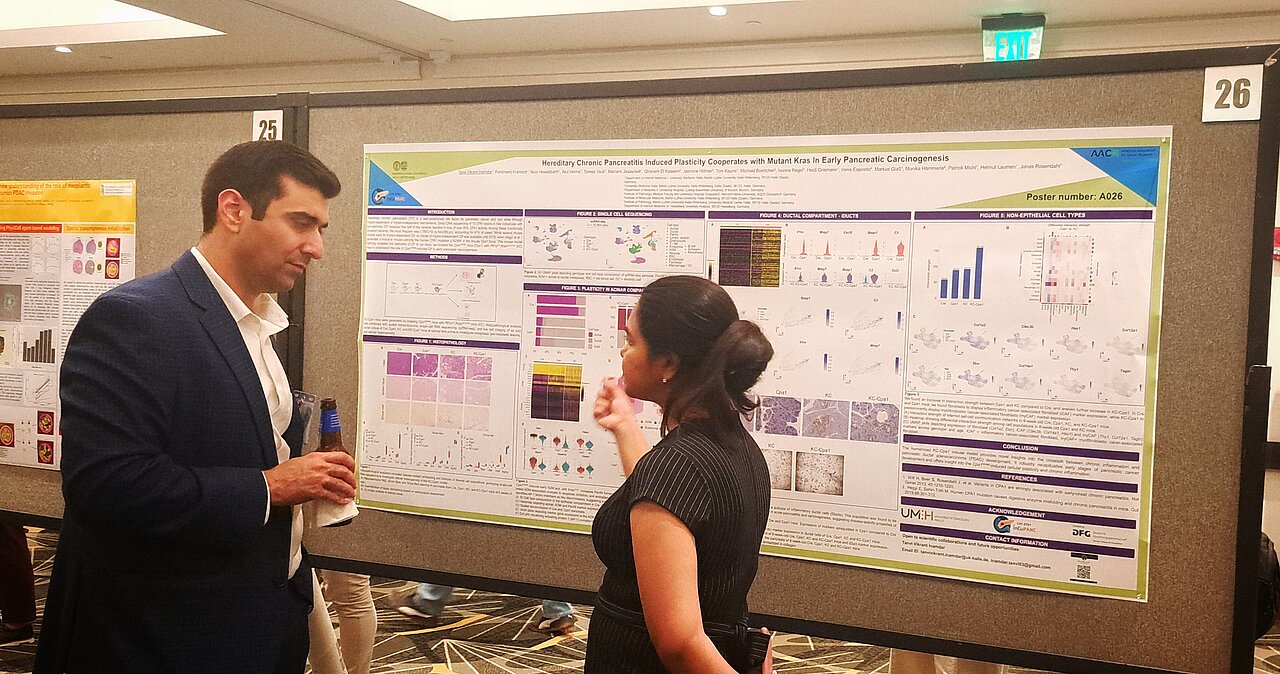
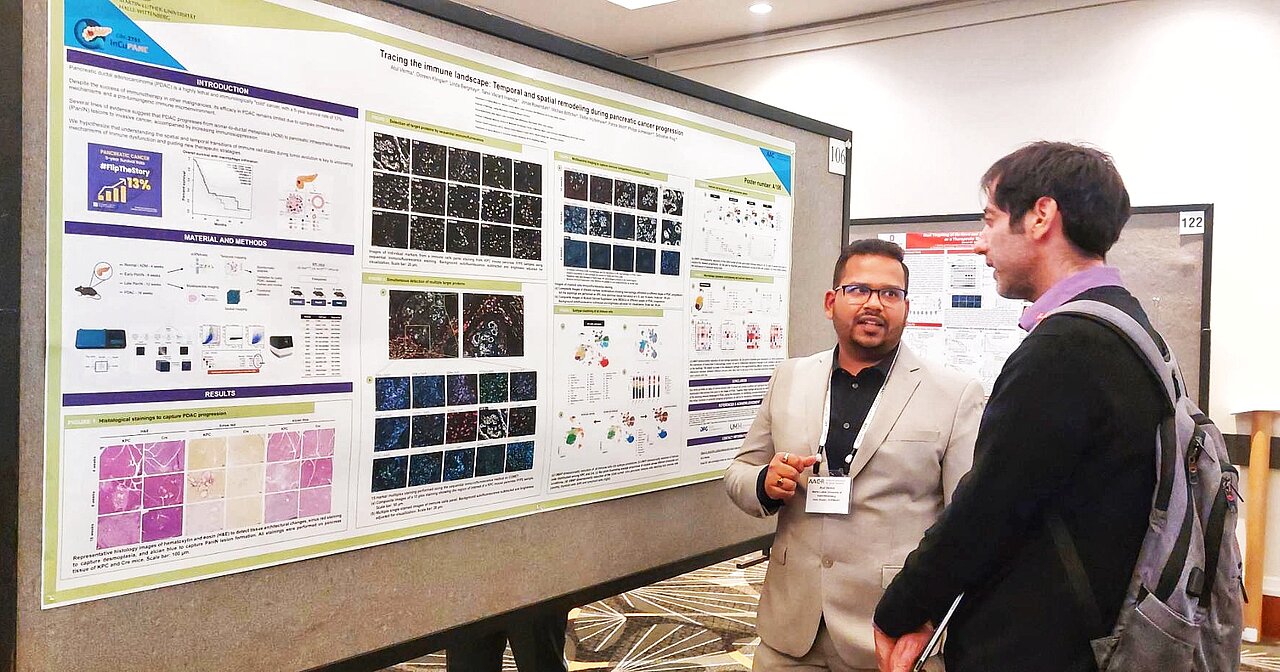
From 17 to 19 November 2025, the 5th German Pancreatic Cancer Research Meeting took place at the Leopoldina in Halle (Saale). The historic setting of the National Academy of Sciences offered an ideal environment for inspiring scientific exchange.
The congress was organized by Prof. Ivonne Regel, Prof. Tony Gutschner, and Prof. Jonas Rosendahl as representatives of the Halle-based Research Training Group InCuPanC with essential support from Ute Lange. Thanks to the support of our sponsors, a diverse and high-quality conference program could be realized, providing excellent conditions for all participants.
Due to an announced state visit, including the German Federal Chancellor Friedrich Merz as well as several representatives of the state government, special security-related arrangements had to be made at the Leopoldina on Tuesday morning. Thanks to flexible and swift adjustments, the conference program continued smoothly. During the first session on Tuesday morning, the political guests, including Friedrich Merz, Saxony-Anhalt’s Minister President Reiner Haseloff, Minister of Economic Affairs Sven Schulze, and Minister of Science Armin Willingmann, briefly visited the event. Although there was no opportunity for direct exchange, their presence nevertheless highlighted the importance of scientific research, particularly in the field of pancreatic cancer and helped strengthen the visibility of Halle as a vital research location.
In line with the graduate program’s “students-first” philosophy, the opening session of the conference was organized and moderated exclusively by PhD candidates of the RTG. This provided early-career researchers with the opportunity to ask both professional and personal questions to experienced scientists in an informal setting.
This opening session set the tone for a conference that placed a clear emphasis on supporting emerging scientists. The two poster sessions offered young researchers space to present and discuss their findings in depth, and selected doctoral researchers were given the opportunity to present their results within the individual sessions. Chaired jointly by a renowned researcher and a PhD student, the sessions featured a balanced mix of contributions from internationally recognized scientists and innovative approaches from the various research groups.
The broad thematic spectrum of the conference covered, in a well-structured manner, current biomarkers, therapeutic strategies, and treatment concepts for pancreatic ductal adenocarcinoma (PDAC), promoted a deeper understanding of PDAC tumor biology, and enabled joint reflection on future developments in both research models and fundamental research approaches.
A varied social program, including guided tours of the Leopoldina or the Meckel Collections, the 5-km “Pancreatic Cancer Run”, and the conference dinner at the Bergschenke, complemented the scientific sessions. The atmospheric setting and shared evening contributed to a memorable conclusion to the second day of the conference.
Overall, the meeting was a great success and underscored the importance of interdisciplinary and international collaboration in the field of pancreatic ductal adenocarcinoma research.
The InCuPanC students-only retreat took place from November 28 to 29 at SaltLabs Halle.
Day 1
The first day was characterized by various scientific presentations. The PhD students' presentations gave a detailed insight into their projects and highlighted the benefits and strengths of collaboration within the Research Training Group. In addition, the various presentations focused on a range of cancer-related topics.
In addition to the central research topic “Tumor-associated macrophages in PDAC”, the presentations covered various tumor entities and introduced novel analytical methods. Each lecture was followed by lively and productive discussions. PhD students and external speakers provided valuable and constructive feedback, fostering a collaborative learning environment.
Day 2
The second day was dedicated to two workshops. In the morning, the workshop focused on “How to Finish Your Thesis”. It offered practical advice on how to avoid procrastination, how to deal with it effectively and how to promote motivation and perseverance throughout the writing process.
The afternoon workshop focused on the topic of 'performance' and explored strategies for effective communication. Participants learned how to perform confidently on stage, how to handle one-on-one conversations and how to develop crucial soft skills such as intonation, clear speech and body language. These skills were not only taught, but also tested in practice.
In summary, the students-only retreat was an academically and collaboratively enriching event. It provided a valuable platform for discussing current research advances while improving our ability to present scientific data effectively.
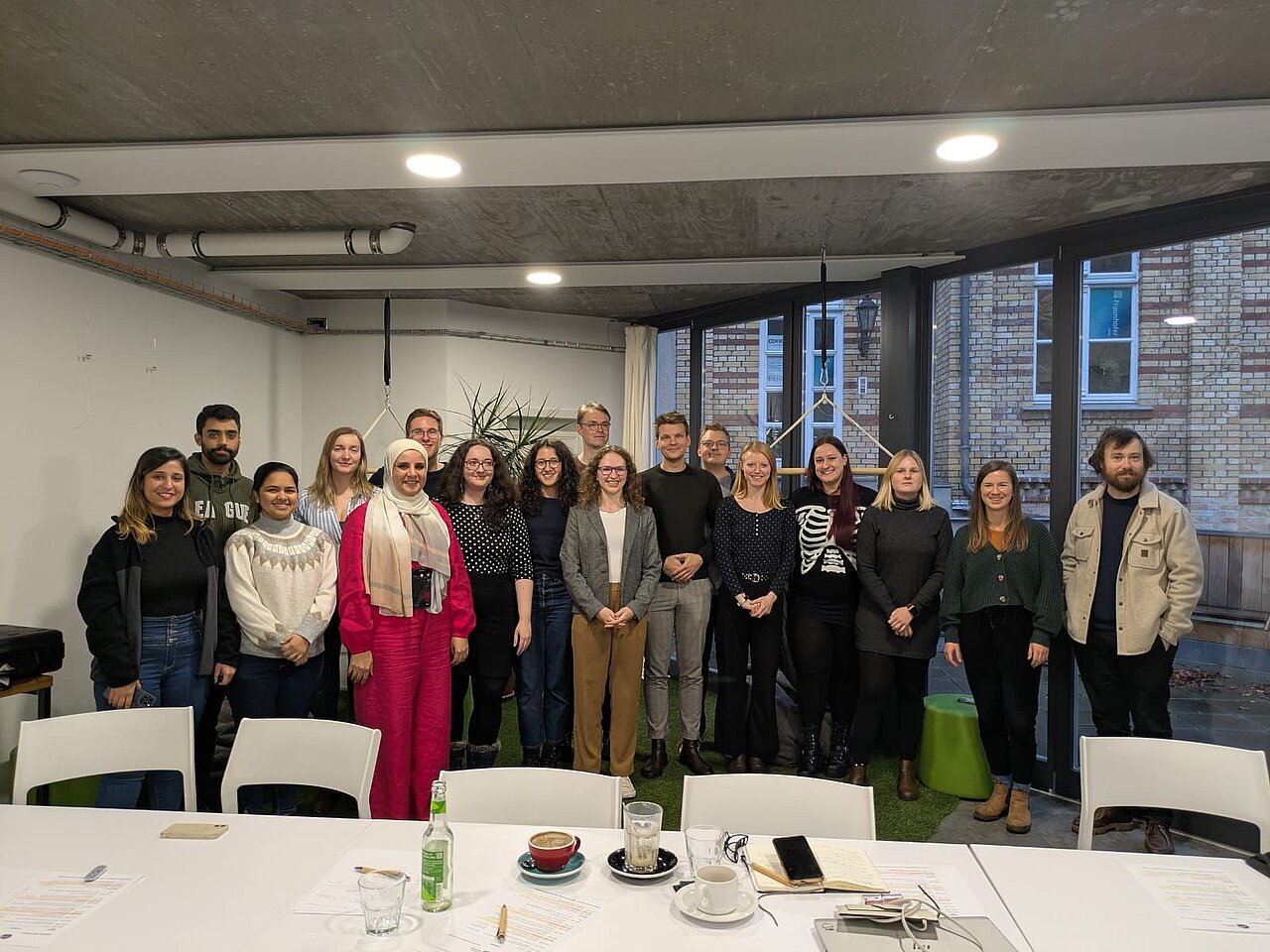
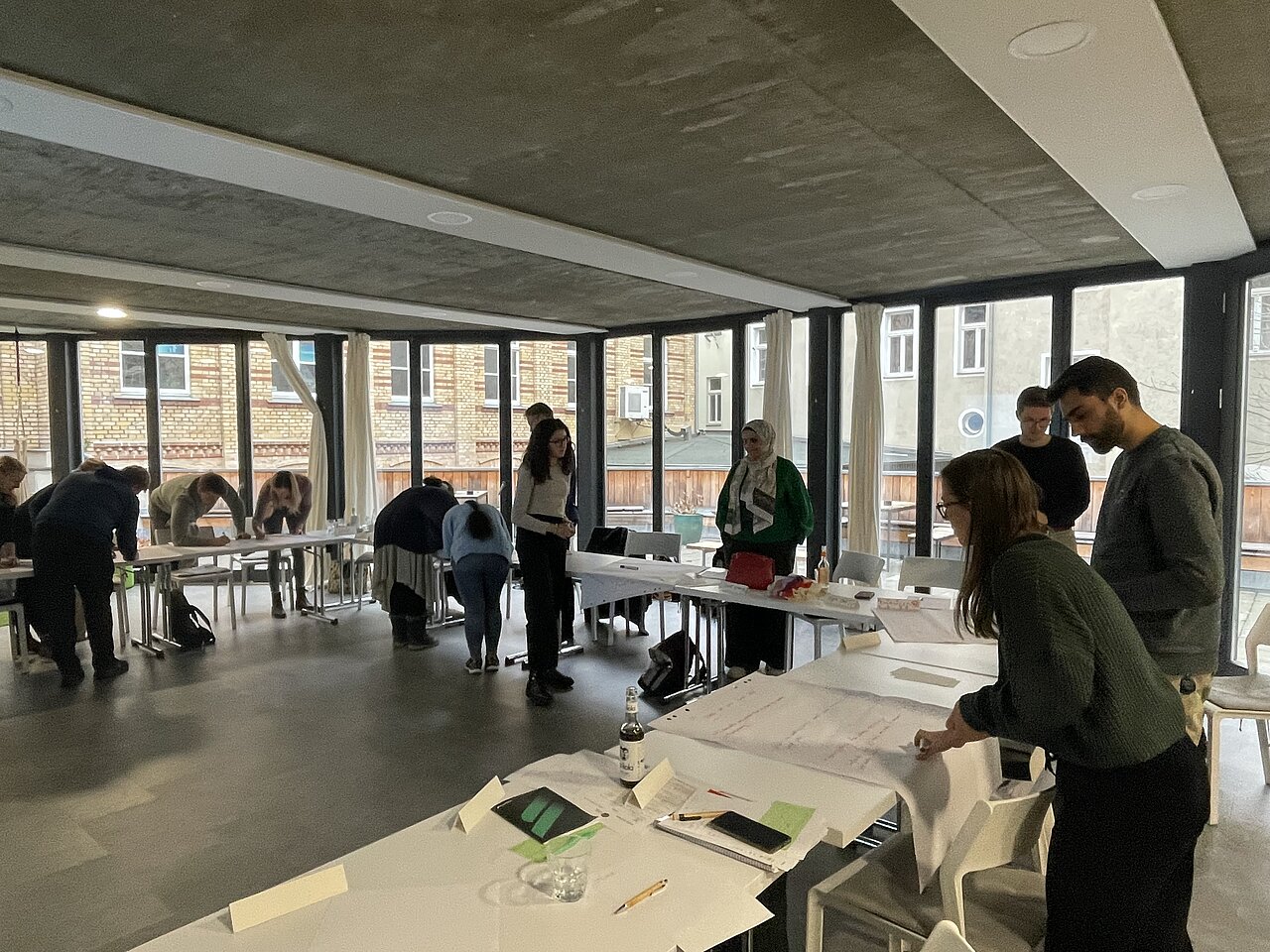
Once a year, the retreat of our Research Training Group (RTG) “InCuPanC” offers all members and guests the opportunity to discuss the current status of their research projects and the latest achievements in pancreatic cancer research over three days. This year's retreat (March 26 to 28) was once again held at the Nimbschen monastery in Grimma near Leipzig. With Professor Miklós Sahin-Tóth (University of California, Los Angeles) and Professor Rainer Heuchel (Karolinska Institute, Stockholm), we were once again able to welcome top-class guests.
Pancreatic carcinoma is one of the most aggressive tumors in humans. With a 5-year survival rate of around eight percent and an increasing incidence, the need for research is high. Before a manifest tumor forms, pancreatic cells pass through various precursor stages in the early development of cancer. A deeper understanding of these precursor lesions opens up new possibilities in the treatment and diagnosis of pancreatic cancer. The 13 research projects of the RTG are each dedicated to different facets of this early carcinogenesis in the pancreas.
The scientific program consisted of scientific lectures by the guests and presentations of preliminary results of the research projects. Professor Sahin-Tóth gave a lecture on pancreatitis and pancreatitis genetics. Professor Heuchel presented research results on pancreatic cancer and co-cultures with immune cells. In addition to the scientific program, there was also a leisure program. This included the course “Networking and small talk” in science and a “moving break”.
Meetings of the doctoral students (Doctoral Assembly) and the Principal Investigators (PI Assembly) completed the program. With intensive discussions, glorious weather and delicious meals, this year's retreat was once again a success. On Maundy Thursday, the group arrived in Halle by coach again in spring-like temperatures.
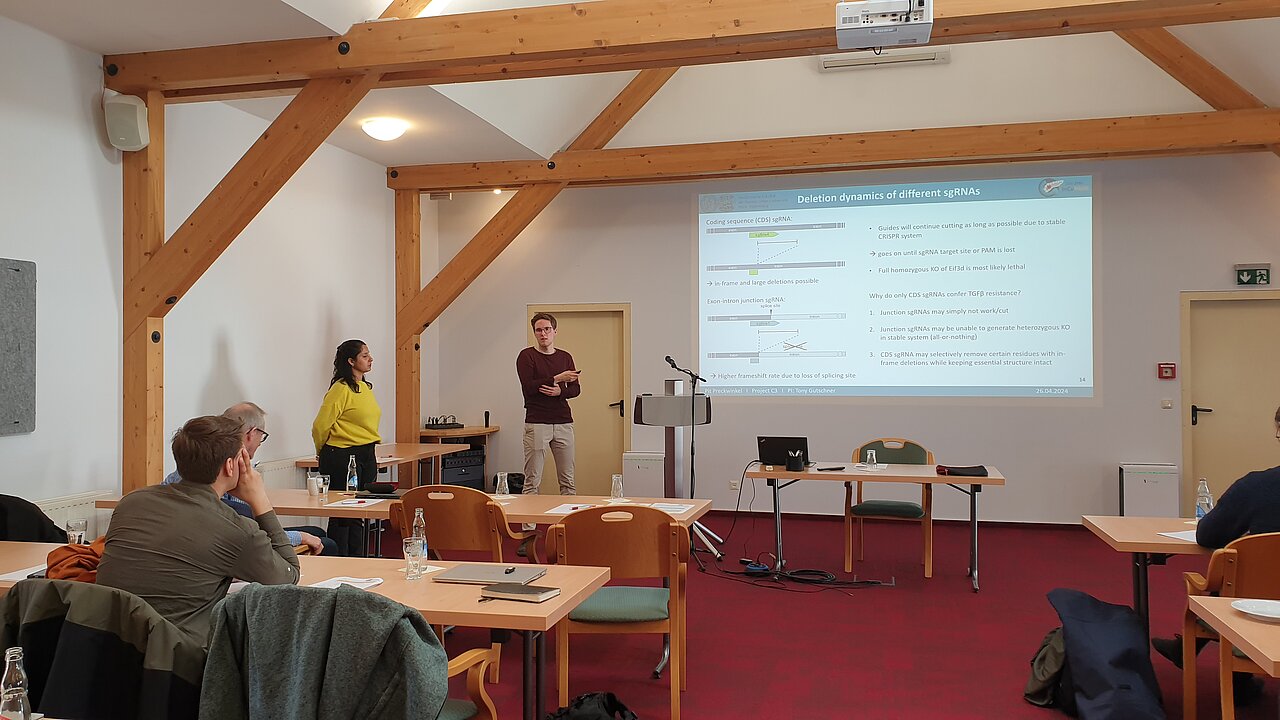
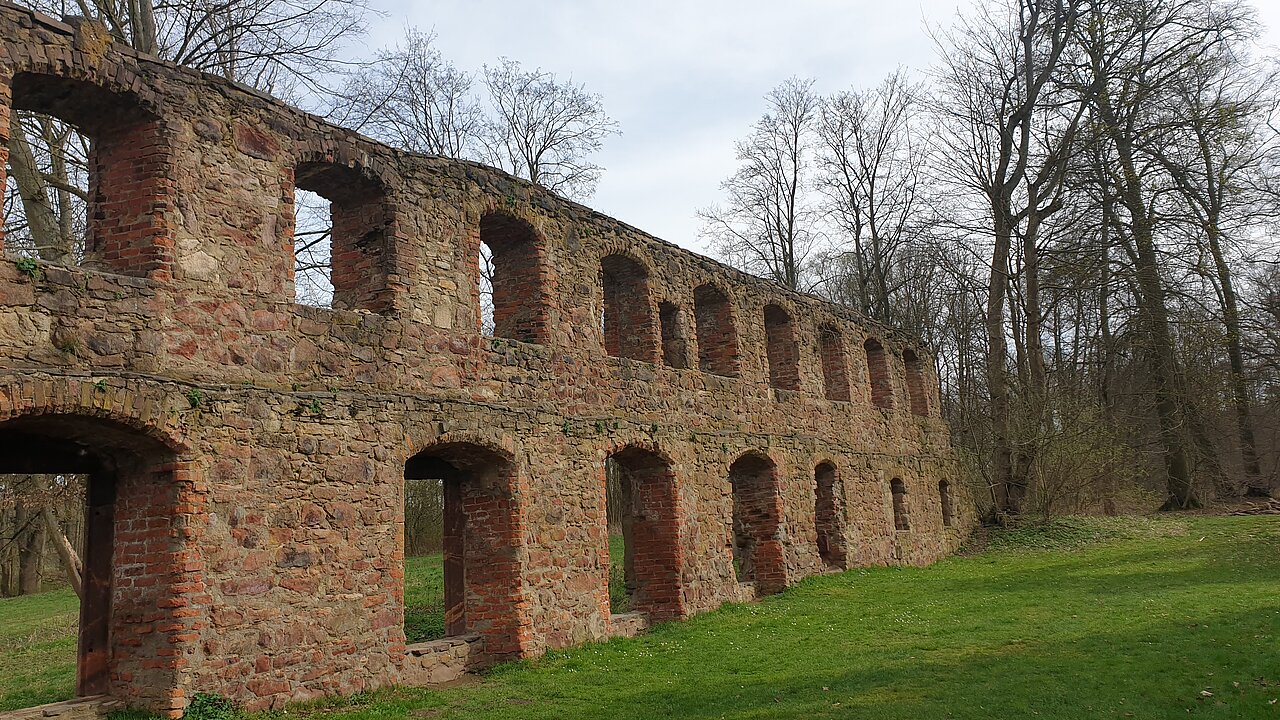
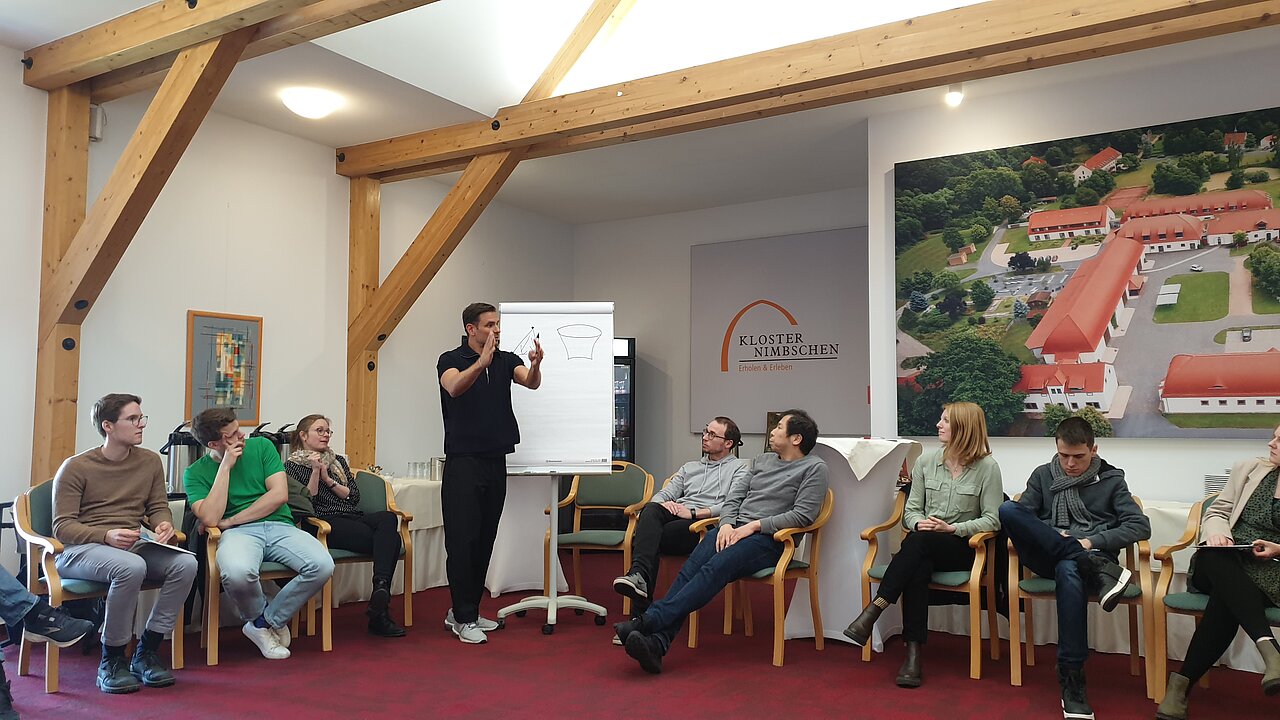
The technologies of single-cell RNA sequencing (scRNA-seq) and spatial transcriptomics have revolutionized the understanding of tissues and cellular processes in recent years. The research training group InCuPanC, together with the biotech company 10x Genomics, hosted a scientific afternoon on February 29. The event began with a presentation by Dr. Martin Seifert and Amelie Megía (10x Genomics). The focus here was on scRNA-seq, spatial transcriptomics and the potential applications of these technologies in medical research.
Afterwards, three researchers from the University Medical Center Halle (Saale) presented their research results. Junior Professor Dr. Michael Böttcher (research group leader and Principal Investigator of the Research Training Group) gave a lecture on transcriptional networks in colorectal cancer cells that mediate resistance to chemotherapy. Afterwards, Dr. Jana Lützkendorf (Postdoc in Hemato-Oncology) presented her research on colorectal cancer cells and stroma-mediated growth. Ghanem El Kassem (PhD student in the Böttcher group) closed the scientific program with a presentation on his research with Perturb-Seq.
After the scientific program there was the opportunity for networking and exchange on scRNA-seq and spatial transcriptomics. A rich buffet and drinks rounded off the scientific afternoon.

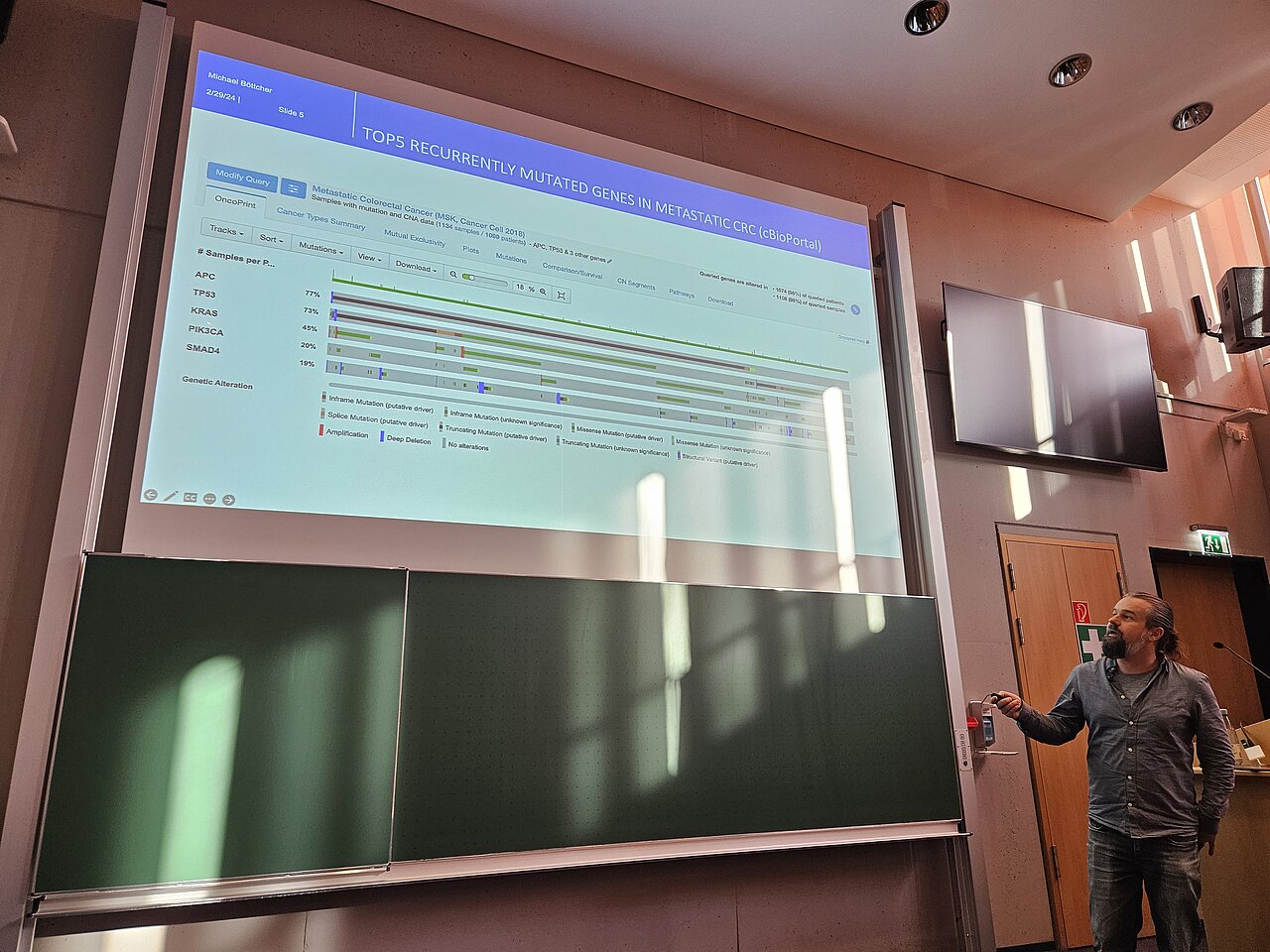
Once a year, all members of our Research Training Group (RTG) and guests come together for a retreat spanning several days. This year, we met from June 19 to 21 at Monastery Nimbschen, a former Cistercian abbey on the outskirts of the Saxon town of Grimma. The idyllic manor house provided an ideal setting to discuss the current state of the individual research projects and the latest advances in pancreatic cancer research over the course of three days.
Our Research Training Group is made up of 13 individual projects investigating the early development of cancer in the pancreas. Doctoral students are assigned to each project and presented the current state of their research and their progress since the last retreat in Wittenberg to the plenary session. Each of the presentations was followed by a discussion on the research topic, the interpretation of the preliminary research results and how to proceed.
Our guests Professor Günter Schneider (University of Göttingen), Dr. Katrin Frank (Technical University of Munich) and Dr. Uddipta Biswas (University of Heidelberg) rounded off the scientific program with presentations on cancer research and pancreatic cancer. The guests were particularly impressed with the positive discussion culture of our RTG. In particular, Günter Schneider praised the constructive and lively exchange of ideas, in which all results were discussed in detail.
Whether eating together in the vaulted hall, socializing over a glass of wine in the evening or during the coffee breaks between lectures - the three-day retreat once again offered many valuable discussions and exchanges between all members. In addition to the scientific program, there was also a leisure program. For example, the "moving break" between the lectures. Some participants also took advantage of the beautiful surrounding countryside for a hike. "The location, accommodation and cuisine - everything felt just right in Nimbschen. We'd love to come back next year," said Sina Krehahn, administrative coordinator, on the return journey together in the coach from Nimbschen to Halle.

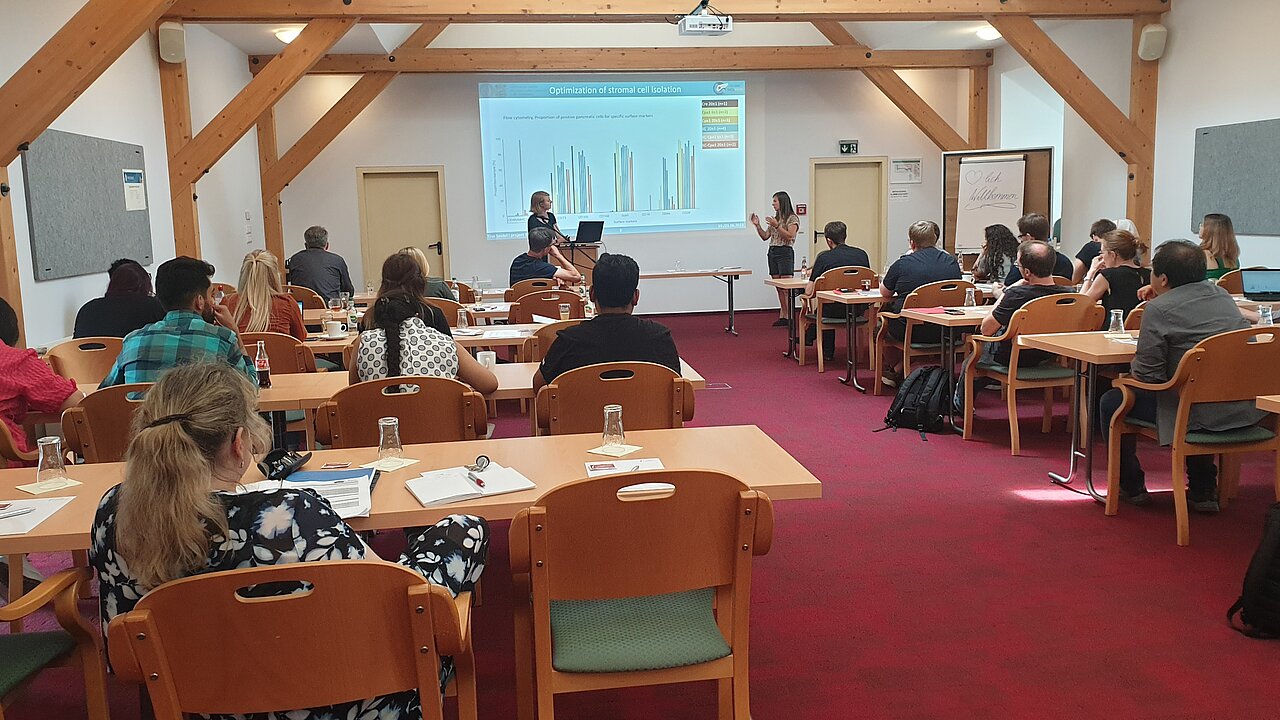
The Research Day of University Medicine Halle brings together young scientists once a year, giving them the opportunity to present their research and promoting exchange. On May 5th, 2023, the Research Day was held for the eighth time already. This year, several PhD students of our Research Training Group presented their research in short talks and on posters.
Elise Arlt investigates the influence of natural killer cells (NK cells) on the early stages of inflammation-associated carcinogenesis in the pancreas. As part of the innate immune system, NK cells play a significant role in the body's fight against cancer. "If NK cells are not functioning properly, a carcinoma can easily spread. Conversely, a developing carcinoma inhibits NK cell function," the PhD student explains. "Our goal is to shed light on the mechanisms and time course of this phenomenon and make it measurable. In our most recent project, we were able to detect NK cell defects in the blood at a clinically inconspicuous, preliminary stage of pancreatic cancer." Her research at the Institute for Anatomy and Cell Biology focuses on a genetically modified mouse model that mimics early inflammation-associated carcinogenesis in the pancreas. The trained veterinarian molecularly characterizes NK cells from the blood and pancreatic tissue of these mice and compares them with the NK cells of healthy littermates. In her work, she also looks at sex-specific differences: "There is an increasing awareness in medicine that the pathophysiology of diseases can differ greatly between the sexes. We were able to show that both the speed at which this carcinoma develops as well as the response of NK cells is strongly sex-dependent." With her poster, Elise Arlt was able to convince the expert jury - she was awarded one of the poster prizes worth 200 euros.
Maryam Khosravian’s research focuses on pancreatic neuroendocrine tumors (PanNETs). PanNETs account for about five percent of all pancreatic tumors and originate from hormone-producing cells in the pancreatic islets. For example, the most common pancreatic neuroendocrine tumor, insulinoma, secretes the blood sugar-lowering insulin. In recent years, the transcription factor CUX1 has been shown to play a significant role in tumor progression and therapy resistance in PanNETs. Transcription factors are proteins that regulate a cell's protein biosynthesis. "My research aims to unravel the molecular mechanisms by which the transcription factor CUX1 promotes PanNET tumor progression," the PhD student explains. In the laboratory of the Clinic of Internal Medicine I, Maryam Koshravian studies PanNET cell cultures in which she silences the CUX1 gene (knockdown). Using molecular biology methods, she characterizes these tumor cells and gains detailed insights into the pathophysiological significance of CUX1 via RNA expression profiles and proteome analyses. Maryam Khosravian's research has the potential to influence drug therapy in PanNETs: "We have identified several potential targets for pharmacological therapy in PanNETs that are regulated by CUX1. In the future, drugs could target these to improve the therapy and prognosis of patients with PanNETs."
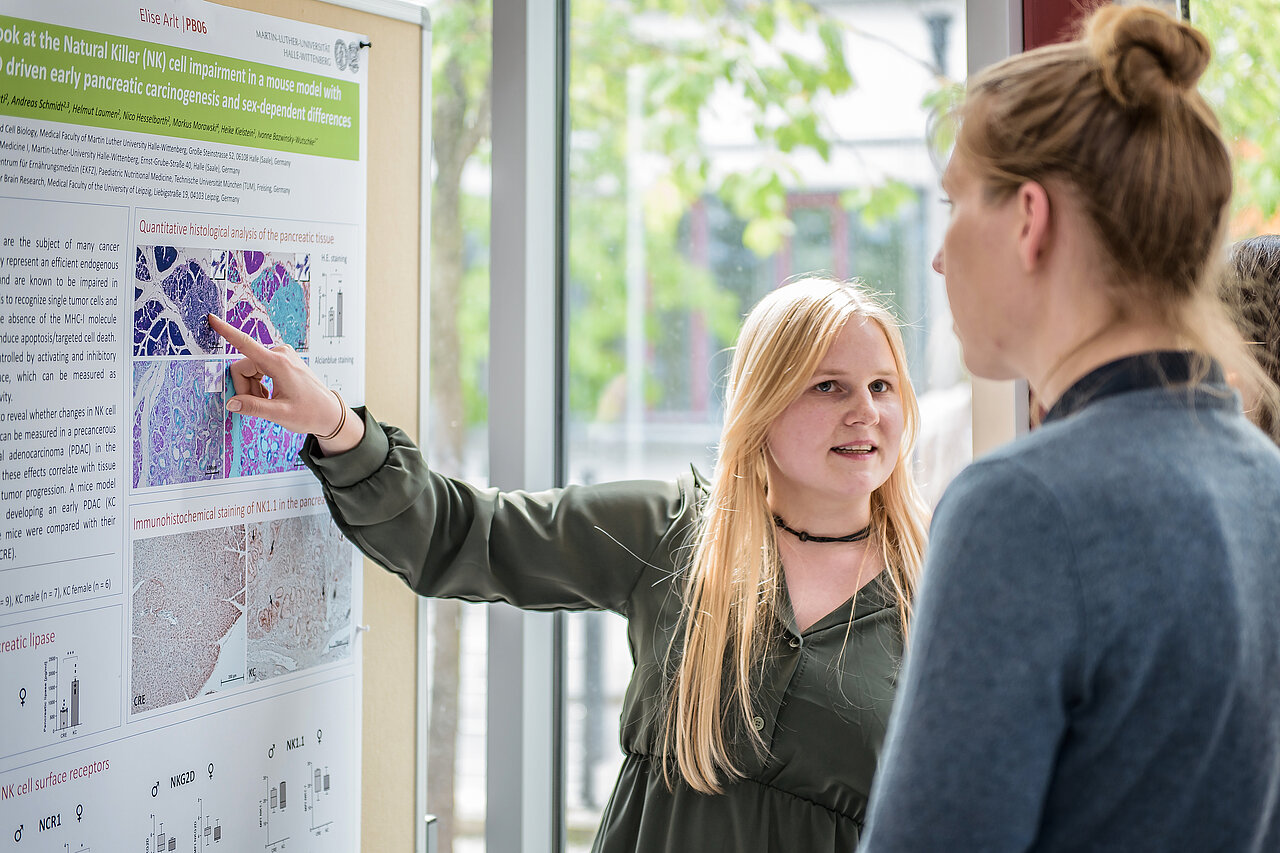
The first retreat of our research training group took place on December 2nd and 3rd, 2022 at the LEUCOREA in Wittenberg. Here, in 1502, the University of Wittenberg was founded, which later became our Martin Luther University Halle-Wittenberg. The conference rooms of the LEUCOREA - the foundation that today cultivates science at the historic site of the University of Wittenberg - were thus ideally suited to host our first retreat. For the retreats, all members of the RTG come together once a year to promote academic exchange and scientific collaboration.
At this first retreat of our RTG, the focus was particularly on getting to know each other. Over the course of the two days, the PhD students presented their respective projects in presentations, which were followed by short discussions about the doctoral project and the current state of their research. With Professor Dieter Saur (Technical University of Munich), Professor Maximilian Reichert (Technical University of Munich) and Laura Roth, MD (research stay at Harvard University), we were able to attract top-class scientists for lectures on current advances in the field of pancreatic cancer research. A workshop on presenting scientific results in front of an audience was also offered for the PhD students.
Whether at the joint meals, the breaks between the lectures or the evening program – the retreat offered our doctoral students many opportunities to get to know each other and the other members of the RTG personally. With a guided tour through the Lutherstadt Wittenberg - including a visit to the famous Theses door of the castle church, on which Martin Luther is said to have nailed his 95 theses in 1517 – the project leaders, PhD students and guests got to know the city on Friday evening. The evening was rounded off with a glass of mulled wine at the Christmas market.
On Saturday, the joint breakfast was followed by several presentations and lectures. Finally, at the end of the two days, Professor Patrick Michl was officially bid farewell as spokesman of the RTG. Professor Michl took up his appointment as the new Director of the Department of Gastroenterology at Heidelberg University Hospital in November. He is succeeded as spokesman by Professor Jonas Rosendahl, acting director of the Clinic for Internal Medicine I and head of the Pancreatic Inflammation Research Group at the University Hospital Halle.
